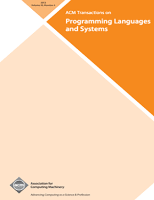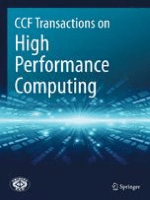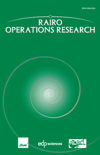
Proceedings of the ACM on Programming Languages-PACMPL
Scope & Guideline
Exploring Cutting-edge Research in Programming Languages.
Introduction
Aims and Scopes
- Programming Language Theory:
Research focusing on the theoretical foundations of programming languages, including type systems, semantics, and formal verification. - Practical Programming Language Implementation:
Studies that address the practical aspects of implementing programming languages, such as compilers, interpreters, and runtime systems. - Program Analysis and Verification:
Papers that explore techniques for analyzing and verifying programs to ensure correctness, security, and performance. - Domain-Specific Languages (DSLs):
Research dedicated to the design and implementation of DSLs tailored for specific application domains, enhancing expressiveness and usability. - Concurrency and Parallelism:
Contributions that investigate programming models and languages that facilitate concurrent and parallel programming. - Probabilistic and Quantum Programming:
Research that delves into programming paradigms for probabilistic and quantum computation, addressing unique challenges and opportunities. - Type Systems and Type Inference:
Studies focused on the design and implementation of advanced type systems, including gradual typing and type inference techniques. - Programming Language Education:
Research that examines pedagogical approaches to teaching programming languages and concepts, often incorporating experiential learning.
Trending and Emerging
- Machine Learning Integration:
There is a growing trend toward integrating machine learning techniques into programming languages, enabling more intelligent code generation, analysis, and optimization. - Quantum Computing Languages:
Research on programming languages designed for quantum computing is on the rise, reflecting the increasing importance of quantum algorithms and applications. - Effect Handlers and Algebraic Effects:
A notable increase in studies related to effect handlers and algebraic effects, which provide powerful abstractions for managing side effects in programming. - Formal Methods and Verification Techniques:
The journal has seen an uptick in publications focusing on formal methods and verification techniques, driven by the need for reliable and robust software systems. - Gradual Typing Systems:
Emerging interest in gradual typing systems indicates a shift towards languages that effectively combine static and dynamic typing for flexibility. - Domain-Specific Language Development:
The trend towards creating domain-specific languages continues to grow, with a focus on enhancing expressiveness and usability for specific applications. - Resource-Aware Programming:
Research addressing resource management and efficiency in programming, particularly in the context of concurrent and distributed systems, is gaining traction.
Declining or Waning
- Imperative Programming Paradigms:
Research focused on imperative programming languages has waned, as the community increasingly gravitates towards functional and declarative paradigms. - Traditional Static Analysis Techniques:
While still relevant, conventional static analysis methods are being overshadowed by more advanced techniques such as dynamic analysis and machine learning approaches. - Low-Level Language Implementations:
Interest in low-level language implementations, such as assembly or C, appears to be declining in favor of higher-level abstractions and languages with built-in safety features. - Legacy Systems and Language Interoperability:
Research pertaining to legacy systems and interoperability has seen reduced focus as newer languages and tools emerge, emphasizing modern paradigms and practices.
Similar Journals

Software and Systems Modeling
Elevating Research in Modeling and SimulationSoftware and Systems Modeling is a premier journal published by Springer Heidelberg, dedicated to advancing the fields of software engineering, modeling, and systematic design. With an ISSN of 1619-1366 and an E-ISSN of 1619-1374, this journal has established itself as a critical resource for researchers and practitioners alike since its inception in 2005. The journal currently holds a Q1 quartile ranking in the Modeling and Simulation category and a Q2 ranking in Software, reflecting its influential contributions to the field. Its Scopus rankings further underscore its relevance, positioned at #55 in Modeling and Simulation and #139 in Software, with impressive percentiles of 83rd and 65th respectively. Although it does not currently offer open access, it remains an essential platform for disseminating innovative research and fostering dialogue among professionals in Germany and beyond. The journal’s objective is to publish high-quality articles that contribute to the understanding and development of software and systems modeling, ensuring ongoing advancements in this dynamic arena.

FUNDAMENTA INFORMATICAE
Connecting Minds in Theoretical Computer Science and Beyond.FUNDAMENTA INFORMATICAE is a distinguished academic journal published by IOS PRESS, focusing on the critical intersection of informatics, mathematics, and computer science. Since its inception in 1988, this journal has served as a vital resource for researchers and professionals alike, providing a platform for innovative studies in Algebra and Number Theory, Computational Theory and Mathematics, Information Systems, and Theoretical Computer Science. With an impressive HIndex, and ranking in the Q3 and Q4 categories across various disciplines as of 2023, it underscores its contribution and relevance in advancing the body of knowledge in these fields. The journal's commitment to excellence is reflected not only in its rigorous peer-review process but also in its notable rankings on Scopus, which positions it favorably among its peers. Though not yet available as an open access journal, FUNDAMENTA INFORMATICAE remains a crucial academic venue for authors wishing to disseminate their findings to a global audience, promoting collaboration and further research within the scientific community.

ACM TRANSACTIONS ON PROGRAMMING LANGUAGES AND SYSTEMS
Shaping Tomorrow's Programming Paradigms TodayACM Transactions on Programming Languages and Systems (ISSN: 0164-0925, E-ISSN: 1558-4593) is a prestigious journal published by the Association for Computing Machinery, focusing on advancing the field of programming languages and systems. Established in 1979, this enduring publication has become a significant resource for researchers and practitioners alike, with a convergence extending to 2024. The journal maintains a strong presence in the academic community, currently placed in the Q2 category for Software in 2023, demonstrating its commitment to high-quality research. With a Scopus ranking of #260 out of 407 in Computer Science Software, it highlights a unique niche that bridges theoretical foundations and practical implementations. Although it does not offer open access, the journal ensures quality dissemination of tools, methodologies, and innovations that cater to both seasoned professionals and emerging scholars. The ACM Transactions on Programming Languages and Systems thus plays a crucial role in shaping the future of programming languages and their applications, making it an essential read for anyone vested in the field.

CCF Transactions on High Performance Computing
Exploring Breakthroughs in High-Performance Computing ResearchCCF Transactions on High Performance Computing, published by SPRINGERNATURE, is an esteemed academic journal dedicated to advancing research in the field of high-performance computing. With an ISSN of 2524-4922 and E-ISSN of 2524-4930, this journal provides a platform for disseminating innovative findings, methodologies, and technologies that shape computational practices within various domains. Operating from Germany, it serves a global audience, reinforcing its impact through an impressive categorization in the Q3 quartile across multiple fields, including Computer Science Applications and Information Systems. The journal, which covers research from 2019 to 2024, plays a crucial role in bridging gaps between theory and practical implementation in hardware architecture and software systems. Although it is not an open-access journal, its contributions are invaluable for researchers, professionals, and students invested in the continuous evolution of high-performance computing. With Scopus rankings that highlight its relevance and influence in the academic community, CCF Transactions on High Performance Computing remains a key resource for the latest developments in this dynamic and rapidly evolving discipline.

FORMAL METHODS IN SYSTEM DESIGN
Pioneering formal methods for robust design.FORMAL METHODS IN SYSTEM DESIGN, published by Springer, is a pivotal journal in the fields of Hardware and Architecture, Software, and Theoretical Computer Science. With an ISSN of 0925-9856 and an E-ISSN of 1572-8102, it has been at the forefront of advancing the understanding and implementation of formal methods since its inception in 1992, with a convergence slated through 2024. Given its ranking in the Q3 category across multiple computer science disciplines, it serves as a critical resource for researchers and practitioners looking to enhance the reliability and performance of complex systems. The journal offers an excellent platform for disseminating high-quality research that addresses the rigorous analytical techniques required for system design, making it invaluable for academics, professionals, and students alike. Notably, FORMAL METHODS IN SYSTEM DESIGN is based in the Netherlands, with its offices located at VAN GODEWIJCKSTRAAT 30, 3311 GZ DORDRECHT, NETHERLANDS, and although it does not currently offer open access, the journal's comprehensive archive remains accessible for deeper research into the formal methodologies that shape contemporary computing paradigms.

Journal of Object Technology
Catalyzing Innovation in Software Development PracticesJournal of Object Technology is a premier publication housed under the esteemed JOURNAL OBJECT TECHNOLOGY in Switzerland, dedicated to advancing the field of software engineering and technology. With a history of continuous publication since 2002, this journal serves as a platform for innovative research, critical reviews, and case studies that explore the nuances of object-oriented technologies and their applications in software development. Although currently categorized in the lower quartile (Q4), this journal's focus on relevant and emerging topics remains vital for researchers, professionals, and students alike, seeking to enhance their understanding of contemporary software-related issues. Addressing significant milestones and offering insights into future directions, the Journal of Object Technology plays an essential role in the evolving landscape of computer science, providing open access opportunities that ensure wide dissemination of knowledge. Situated at ETH Zurich, the journal is committed to fostering collaboration and dialogue among researchers worldwide, underscoring its importance within the global scholarly community.

RAIRO-OPERATIONS RESEARCH
Navigating complexity through innovative research and insights.RAIRO-Operations Research is a distinguished journal published by EDP Sciences S A, focusing on the intricate fields of operations research, management science, and computer science applications. Established in 1977, this French-based journal encompasses a rich legacy of contributing to theoretical advancements and practical applications that equip researchers, professionals, and students with the insights necessary to navigate complex decision-making environments. With a notable Scopus ranking in various categories, including a Q3 position in Computer Science Applications, Management Science and Operations Research, and Theoretical Computer Science, the journal aims to foster innovation and share impactful research findings. As an insightful platform, RAIRO-Operations Research is essential for those seeking to deepen their understanding and enhance their expertise in operational methodologies, while also offering a range of access options for its wide readership. Delve into the journal to explore transformative research that pushes the boundaries of operations research.

Genetic Programming and Evolvable Machines
Shaping Tomorrow's AI through Evolutionary InsightsGenetic Programming and Evolvable Machines, published by SPRINGER, is a leading journal dedicated to the fields of genetic algorithms, evolutionary computation, and machine learning. With an ISSN of 1389-2576 and an E-ISSN of 1573-7632, this esteemed journal encompasses original research articles, reviews, and applications that explore the intricate relationships between intelligent systems and evolutionary processes. As of 2023, it holds a notable Q2 ranking in various categories including Computer Science Applications and Hardware and Architecture, reflecting its significant impact in advancing knowledge and methodologies within these domains. The journal's metrics, including a top rank of #31/130 in Theoretical Computer Science, signify its relevance and contribution to the broader academic community. Though not open access, papers published in the journal continue to serve as critical resources for both researchers and practitioners, promoting innovative methodologies and solutions. Covering a broad scope with a convergence extending from 2003 to 2024, this journal remains a pivotal platform for sharing cutting-edge research that shapes the future of artificial intelligence and computational theory.

PROGRAMMING AND COMPUTER SOFTWARE
Fostering a Deeper Understanding of Software ComplexitiesPROGRAMMING AND COMPUTER SOFTWARE is a distinguished journal committed to advancing the field of software development and programming methodologies. Published by PLEIADES PUBLISHING INC, this journal has been a valuable resource since its inception in 1978, reaching out to researchers, professionals, and students alike. With an emphasis on rigorous peer-reviewed articles, the journal holds a Q3 ranking in the realm of Software according to the latest 2023 Category Quartiles. Though it does not offer open access, the journal ensures that high-quality research is disseminated to its audience, providing insights into evolving programming techniques, software engineering challenges, and innovative solutions. With its convergence of years extending to 2024, PROGRAMMING AND COMPUTER SOFTWARE remains a pivotal publication, fostering a deeper understanding of the complexities in computer programming while supporting the broader software community.

ENGINEERING OPTIMIZATION
Transforming Ideas into Engineering SolutionsENGINEERING OPTIMIZATION is a premier academic journal published by Taylor & Francis Ltd that has been at the forefront of the fields of Applied Mathematics, Computer Science Applications, Control and Optimization, Industrial and Manufacturing Engineering, and Management Science and Operations Research since its inception in 1974. With an impressive convergence period extending through 2024 and categorized in the Q2 quartile across various relevant disciplines, this journal is well-regarded for its rigorous peer-reviewed articles that address the latest advancements in optimization methodologies and their applications across industries. With current Scopus rankings placing it in the top percentiles for Applied Mathematics and Control and Optimization, ENGINEERING OPTIMIZATION serves as a vital resource for researchers, professionals, and students alike, dedicated to pushing the boundaries of knowledge and innovation in engineering and related fields. This journal does not offer Open Access; however, it remains accessible through institutional subscriptions and university libraries.